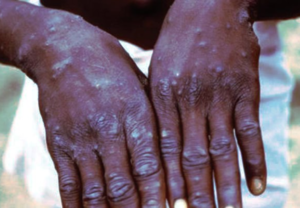Mpox: 21,466 cases, 591 deaths in 13 countries, says Africa CDC

The Africa Centres for Disease Control and Prevention of the Africa Union, Africa CDC, has confirmed a total of 21,466 Mpox cases and 591 deaths in 13 African countries since the beginning of 2024.
The agency has also advocated the approval of Mpox vaccines for use by all the Africa Union member States, amid global shortages.
The Director General of the Africa CDC, Dr Jean Kaseya who gave the update in a letter to the Ministers of Health of the African Union Member States, called for a holistic approach to the Mpox response among African Union Member States.
In the letter titled: “ Update on the Mpox outbreak in Africa”, Kaseya advocated universal approval of introduction of Mpox vaccines in Africa
“From 2023 to date, the Mpox viral zoonotic disease has been reported in 16 African Union
Member States in all five AU regions, with a high case fatality rate above 3.9 percent.
“From 1st January 2024 to 23rd August 2024, a total of 21,466 cases (3,350 confirmed; 18,116
suspected) and 591 deaths with case fatality rate (CFR): 2.9 percent of Mpox, have been reported from 13 Africa Union (AU) Member States.”
The affected countries were listed as Burundi, Cameroon, Central Africa Republic, Congo, Côte d’Ivoire, Democratic Republic of Congo, Gabon, Liberia, Kenya, Rwanda, South Africa, Uganda and Nigeria.
“Even as I wrote this letter, Gabon has confirmed its first case, while Sierra Leone and Malawi are now testing their suspected cases,” Kayesa stated.
On the confirmation of Mpox cases by Member States, Kaseya declared, “Some of you are reaching out to us especially in the context where lab is negative for Mpox. To better advise you, Africa CDC have also consulted.
“I consulted our African best epidemiology and lab experts but also international experts and appropriate bodies like US CDC, China CDC, Europe CDC and WHO.
“I would like to draw Your Excellencies’ attention to the fact that a negative test result in
the laboratory does not mean there is no Mpox epidemic.
“The conclusion is that relying solely on laboratory test results for diagnosing Mpox is not advisable. We need a holistic approach that integrates laboratory testing with
clinical assessment and epidemiological data that is essential for accurately diagnosing
and managing Mpox,” he explained.
Kaseya said diagnosis and management of Mpox should involve a comprehensive approach that considers multiple factors that include clinical presentation, epidemiological context, history, risk factors, and lab testing among others .
“Regarding the Mpox testing, it can sometimes yield a negative result in the laboratory even when the disease is present due to several factors. The accuracy of Mpox testing depends significantly on when the sample is collected.
“If the sample is taken too early or too late in the course of the infection, the viral load might be too low to be detected.
“The signs and symptoms of Mpox, such as fever, rash, swollen lymph nodes, and lesions, are critical in diagnosing the disease. A thorough clinical examination is essential, especially when laboratory results are inconclusive or negative.
“Understanding the patient’s exposure history, such as contact
with known cases or travel to areas with ongoing Mpox outbreaks, is crucial. This context
can provide strong evidence for a probable case, even in the absence of positive lab results,” he asserted.
In his view, while important, lab tests should be interpreted in conjunction with clinical and epidemiological data.
“False negatives are possible, and a negative test does not entirely rule out Mpox, especially if there is strong clinical suspicion. For all Mpox cases, countries have to perform HIV and STI tests.
“ No test is perfect, and some Mpox tests may have lower sensitivity, meaning they might not detect very low levels of the virus. This can result in a false negative if the viral load in the sample is below the test’s detection threshold.”
On viral variability, he said different strains or mutations of the Mpox virus might not be as easily
detected by certain tests, especially if the tests were designed for a specific strain.
“ In some cases, an individual’s immune system might clear the
virus or suppress its replication to levels undetectable by laboratory tests, even though the disease was present.
Noting that only Nigeria, South Africa and the DRC have already approved the utilization of the Mpox vaccines Kayesa said it is critical for other countries to approve the introduction of the vaccines
“The tension of the increasing demand of the vaccines by western nation and the
monopoly in the manufacturing of vaccines (BN is the only one currently manufacturing this vaccine), puts Africa at a disadvantage in securing the vaccines given the limited
market demand by African leaders.
“There is a serious risk that Africa will not be considered in the distribution of the vaccines and other medical countermeasures if African leaders don’t come strongly together to make their voice on the fight against this disease.
“Risk now openly mentioned in some Western countries to impose travel restrictions to Africa if our leaders and communities don’t take this outbreak seriously
“Suboptimal communication activities to raise awareness of population and sensitize them for the use of vaccines. Support will be provided for affected countries with the donation of vaccines already secured,” he said.
On the complexities around the vaccines, the DG stated that while vaccine access is limited, the benefits of an expensive vaccine with limited clinical efficacy data need to be carefully assessed and a plan developed to ensure vaccines are appropriately deployed to maximise benefit.
“We need to ensure that regulatory authorities agreed to use the vaccines, the supply chain logistics is in place, and communication activities are ongoing to ensure acceptance of the vaccines by the targeted population.”
Vanguard
| Join our new WhatsApp community! Click this link to receive your daily dose of NEWS FLASH content. We also treat our community members to special offers, promotions, and adverts from us and our partners. If you don’t like our community, you can check out any time you like. |












